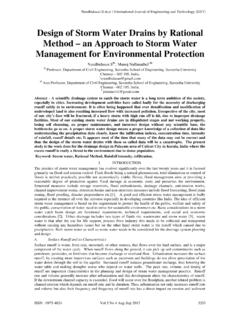Transcription of A summary of - World Health Organization
1 ALCOHOL IN developing SOCIETIES summary . WHO Library Cataloguing-in-Publication Data Alcohol in developing societies : a public Health approach . summary drinking - prevention and control policy cooperation countries ISBN 92 4 159046 7. ISSN 0356-2654 (NLM classification: WM 274). World Health Organization 2002. All rights reserved. Publications of the World Health Organization can be obtained from Marketing and Dissemination, World Health Organization , 20 Avenue Appia, 1211 Geneva 27, Switzerland (tel: +41 22 791 2476; fax: +41 22 791 4857; e-mail: Requests for permission to reproduce or translate WHO publications whether for sale or for noncommercial distribution should be addressed to Publications, at the above address (fax: +41 22 791 4806.))
2 Email: The designations employed and the presentation of the material in this publication do not imply the expression of any opinion whatsoever on the part of the World Health Organization concerning the legal status of any country, territory, city or area or of its authorities, or concerning the delimitation of its frontiers or boundaries. Dotted lines on maps represent approximate border lines for which there may not yet be full agreement. The mention of specific companies or of certain manufacturers' products does not imply that they are endorsed or recommended by the World Health Organization in preference to others of a similar nature that are not mentioned. Errors and omissions excepted, the names of proprietary products are distinguished by initial capital letters.
3 The named authors alone are responsible for the views expressed in this publication. The World Health Organization does not warrant that the information contained in this publication is complete and correct and shall not be liable for any damages incurred as a result of its use. Printed in Finland Acknowledgements The World Health Organization acknowledges the contributions of the authors of Alcohol in developing societies: a public Health approach on which this summary is based. WHO also acknowledges the Finnish Foundation for Alcohol Studies and the Swiss Federal Office of Public Health for their financial support. This summary was written by David Jernigan on behalf of authors of the book. 1. ALCOHOL IN developing SOCIETIES summary .
4 CONTENTS. Executive summary --------------------------------- ---------------------------------------- ----------------1. Introduction---------------------------- ---------------------------------------- --------------------------------5. Drinking in developing countries: the economic, social and cultural context-----------------6. Global patterns and trends in alcohol production and consumption----------------------------8 . Alcohol as a commodity in developing economies------------------------------- -----------------10. Drinking patterns in developing societies------------------------------- -----------------------------13. Problems related to drinking-------------------------------- ---------------------------------------- ----16.
5 Targeting individual behaviour change to reduce alcohol-related problems----------------19. Targeting environmental change to reduce alcohol-related problems------------------------20. Building an effective response to alcohol-related problems-------------------------------- -----23. References cited----------------------------------- ---------------------------------------- -----------------25. 2. ALCOHOL IN developing SOCIETIES summary . Executive summary The current situation In general adults in developing countries are more likely to abstain from drinking than adults in the developed countries. In much of the World , drinking by adult women has been relatively uncommon, but in some places, this is changing. In a given group, the cultural framing and meaning of drinking may be resistant to change, but the frequency of drinking and of heavy drinking occasions can change.
6 In many parts of the developing World , traditional drinking patterns dominated by sporadic episodes of intoxication continue, but involvement in the cash economy and industrialization of alcohol production and distribution have permitted the episodes to become more frequent, often in the form of weekend binge drinking. Given this pattern of drinking in many developing societies, problems associated with intoxication episodes typically predominate, including injuries and interpersonal violence causing harm to the drinker and to others, as well as adverse impacts on family and community life and functioning Development also makes regular heavy drinking more feasible, so that alcohol also makes an increasing contribution to chronic Health problems, often in conjunction with endemic infections, poor and inadequate nutrition, and unsanitary conditions.
7 In terms of total years of life lost to premature mortality and disability, alcohol's net effect is is negative everywhere. The burden of social problems from drinking is mostly unmeasured, but qualitative evidence suggests it is also large in many parts of the developing World . In terms of Although alcohol's potential protective effect against cardiovascular total years of disease (CVD) has drawn much attention, alcohol's net effect on heart life lost to disease is negative in the World , because of both patterns of drinking and nutrition and lifestyle. In developing countries it is negative also premature because the prevalence of CHD is low and the main causes of death mortality and are different. disability, Drinking is a gender issue everywhere, in that men do more (in some places most or all) of the drinking, but women disproportionately suffer alcohol's net the consequences.
8 Effect is The levels of alcohol-related problems in a given society tend to rise everywhere and fall, all else being equal, with changes in the level of per-capita negative. alcohol consumption in the society. 3. ALCOHOL IN developing SOCIETIES summary . Alcohol production and economic and social development In most developing societies, home and cottage production of The levels of indigenous or indigenized beverages exists alongside industrial production of European-style and indigenous beverages. alcohol-related problems in a Particularly in Africa, home and cottage production is a major source of employment for women, particularly single heads of household, and given society industrialization of production results in employment losses particularly tend to rise and for women.
9 Fall with Industrially produced beverages, particularly lager beer, are gradually changes in the gaining ground against indigenous beverages, on the basis of prestige, promotion and other advantages, although they are typically more level of per- costly. capita alcohol There may be Health benefits from replacing cottage-produced by consumption in industrially produced alcohol in terms of the purity of the product. However, these benefits should also be empirically verified, since they the society. can easily be overstated. Industrialized beer or spirits production is not labour-intensive and not a major source of employment in itself; thus industrializing alcohol production diminishes employment in it. Industrialization makes some contribution to building transferable skills and technical expertise in a developing society, but this contribution will be limited in the case of the typical joint-venture lager brewery with a multinational corporation, using turnkey technology, expatriate technical staff, and imported agricultural inputs.
10 Industrialization of alcoholic beverages may help foster transport and distribution networks in a developing country, particularly if the product is semi-perishable ( , commercial opaque beer). Most employment related to alcoholic beverages is in retail sales (including restaurants and bars) and likely to be relatively little affected by the industrialization of alcohol production. The primary way in which industrialization might affect retail employment would be if it causes alcoholic beverage consumption to rise. In this case, levels of problems from drinking are also likely to rise. Most alcoholic beverages are drunk relatively close to the point of production. Significant exports of alcoholic beverages are not a realistic prospect for most developing societies.
















